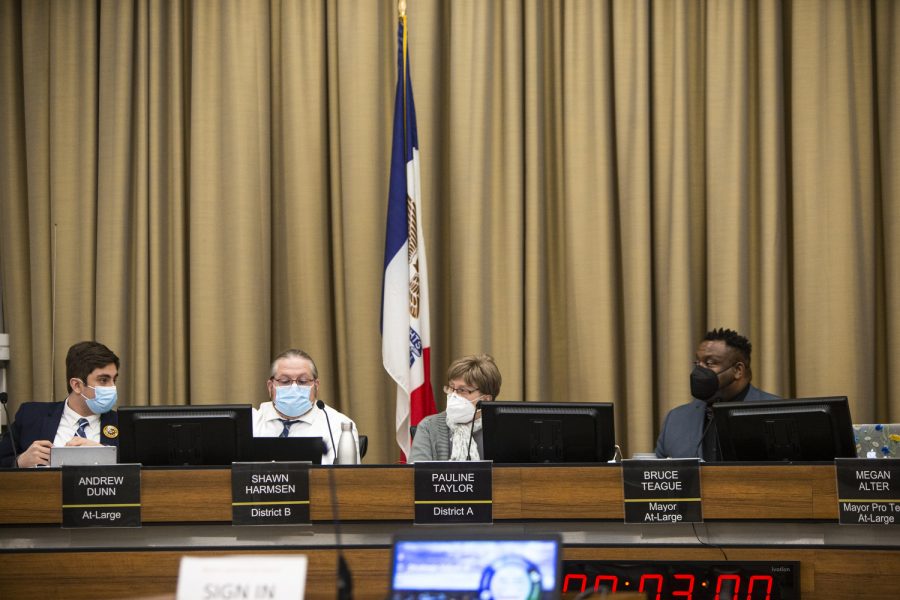Iowa City city officials concerned about future budget cuts
A proposed state-level bill would decrease residential property taxes, thus leading to lower revenue and budget cuts for the city, Iowa City city staff said.
City council members communicate during an Iowa City City Council meeting at City Hall on Jan. 24, 2023.
February 14, 2023
City of Iowa City staff has expressed concerns about future budget cuts following the proposed Iowa Legislature bill that would decrease the city’s revenue from residential property taxes.
The bill, Senate File 181, would result in a $1.7 million loss of revenue for City of Iowa City services between the current fiscal 2023 budget and the upcoming fiscal 2024 budget. Fiscal 2023 started July 1, 2022, and will end on June 30, 2023. Fiscal 2024 will begin on July 1 and will end on June 30, 2024.
Iowa City Finance Director Nicole Davies said property taxes make up over 2/3 of the city’s general fund, which the city uses to fund governmental services, such as the police and fire departments, the library, and parks and recreation.
This bill would not largely impact fiscal 2024, but it could affect how the city decides its budgeting decisions moving forward, Davies said.
“Every year when we’re preparing our budget, property taxes are a big number that we look at, and if that decreases, that’s when we have to look at if we have to increase the property tax rate to offset the decrease in valuation,” Davies said.
Iowa City Deputy City Manager Redmond Jones II said while the purpose of the bill is to lower property taxes, the cut in city revenue would ultimately end up having the opposite effect.
“If we’re to maintain our current service levels and yet still have less valuations being able to be taxable … the only way that we’re going to be able to maintain those same service levels is to have to increase our actual tax rate,” Jones said.
Jones also expressed frustration with the proposed legislation because the issue of property tax rates should be left to local governments to deal with instead of the state.
“I think you could probably get more if [the legislature] would be more focused on creating some kind of incentive packages that will incentivize communities to take on tax reduction programs instead of trying to do it themselves,” Jones said. “The tools that [the legislature] has is unequipped to deal with the needs of all the different communities in the state.”
RELATED: Iowa City officials expresses concern over lawmakers’ effort to restrict local government power
Iowa City City Councilor John Thomas said the city has ways to counter the potential impacts of this bill for the current fiscal year, such as reserving funds for short-term fixes or emergencies.
Because the bill has not passed yet, the city is unsure how exactly it would affect future budgets, Thomas said.
“It served as a test to see if we could work through an unanticipated event, but next year we’ll have to take it more into account,” Thomas said.
This revenue issue is also compounded by slow taxation value growth in recent years, a Feb. 2 information packet states.
“Largely due to the 2013 property tax reform and economic downturn during COVID, Iowa City’s taxable valuation from FY 2023 to FY 2024 has only grown 1.8 percent,” the packet states.
If the bill passes, city staff said in the information packet that structural changes may need to be made for fiscal 2025, such as service reduction, increased property tax, or the creation of an entirely new revenue source.
“For context, if the City were to increase our tax rate to overcome the financial hit from SF 181, it would require an approximate thirty-one cent increase to our overall rate,” the packet states.
As of Feb. 14, SF 181 was placed on the Ways and Means Committee calendar on Feb. 13 with a recommendation for passage.



